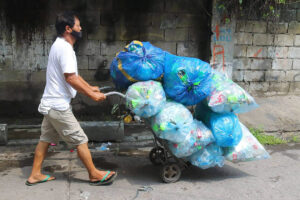THE government’s plan to collect an excise tax on single-use plastics could worsen inflation and present an undue burden to companies, a business chamber said.
The Philippine Chamber of Commerce and Industry (PCCI) said many businesses that use plastic for packaging will incur additional costs and pass them on to consumers.
“If it’s not cost-effective, they will pass on the cost, and it’s going to be costlier for the consumer,” PCCI Chairman George T. Barcelon said by phone.
Last week, the National Economic and Development Authority (NEDA) asked legislators to pass House Bill (HB) No. 4102 or the Excise Tax on Single-Use Plastic Bags.
The measure seeks to impose a P100 excise tax for every kilogram of single-use plastics removed from the place of production or released by the Bureau of Customs.
The bill remains in committee at the Senate. The House approved the bill on third and final reading in 2022.
The Philippines generates 2.7 million tons of plastic waste annually, according to the World Bank.
Mr. Barcelon said the plastic problem is a waste and land management issue, citing the costly logistics of recycling plastics.
“The local government should undertake a study with the private sector on which areas can be used to collect this waste and (process it),” he said.
A recent study by the United Nations Development Programme reported that only 26-58% of households practice waste management.
The government must strengthen its campaign to transition to reusable bags, the Philippine Retailers Association (PRA) said.
“We understand the proposed excise tax on the single-use plastics, but the PRA would like to propose parallel efforts to help reduce use of plastics,” PRA President Roberto S. Claudio said in a Viber message.
“Our biggest concerns are customers in wet markets who need to deal with perishable and wet products,” he said.
To discourage the use of plastics, the government could charge for the use of plastic bags in stores, the PRA said.
“We would like to see a concerted effort from the government and retail industry to promote the use of reusable bags.”
Meanwhile, NEDA also backed HB 26, seeking to ban the production, importation, sale, provision and use of single-use plastics.
Marian Frances T. Ledesma, zero waste campaigner at Greenpeace Southeast Asia-Philippines, said the bill would help cut greenhouse gas emissions, with extraction and production accounting for 90% of the plastic life cycle.
“Bans on single-use plastics can reduce health risks and toxic emissions from plastic production, prevent waste that exacerbates flooding and destroys ecosystems, and cut down on consumers’ exposure to harmful chemicals in plastics,” she said in an e-mail.
Eleanor L. Roque, tax principal at P&A Grant Thornton, expects minimal revenue to be generated from a single-use plastics excise tax.
“I don’t expect the additional tax collection from this to be significant. Major impact of this is really the effect on the environment,” she said in a Viber message.
A portion of funds generated from the tax should be allocated to assist micro-, small- and medium-sized enterprises in their transition to reusable bags, Ms. Ledesma said. — Beatriz Marie D. Cruz
